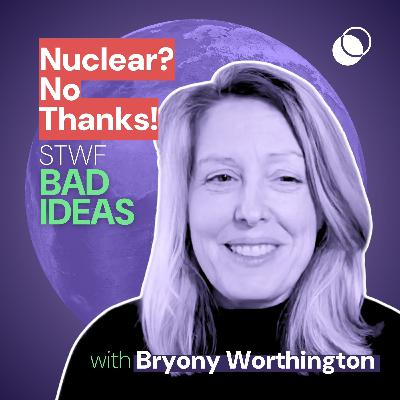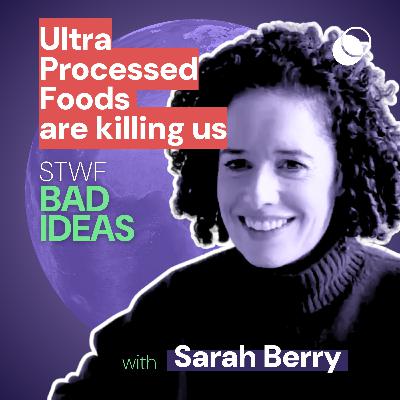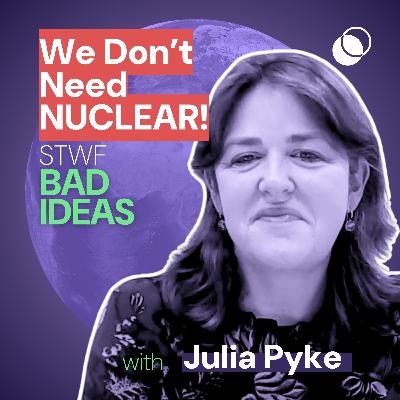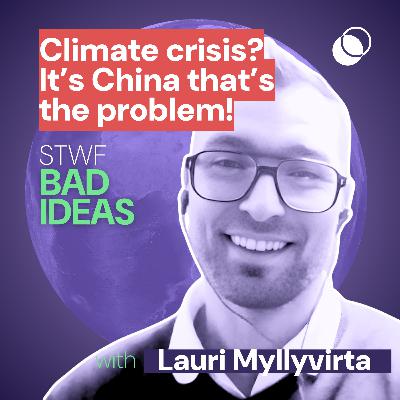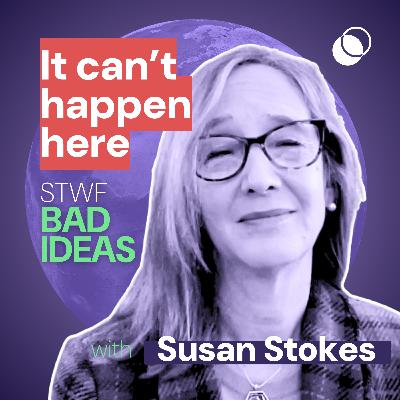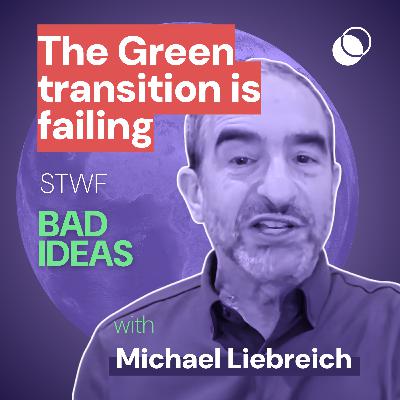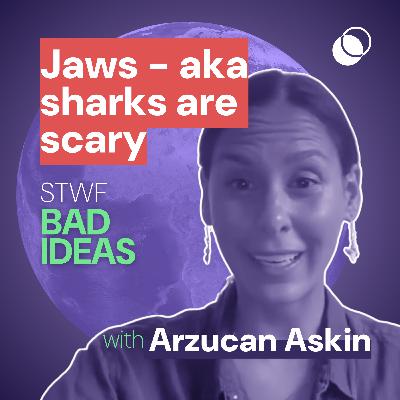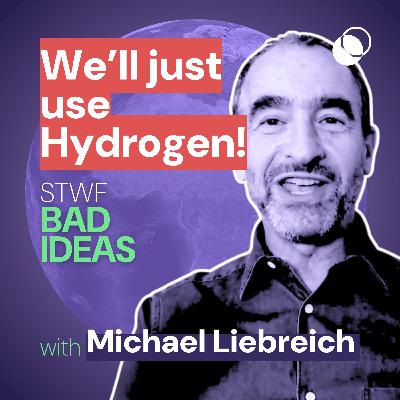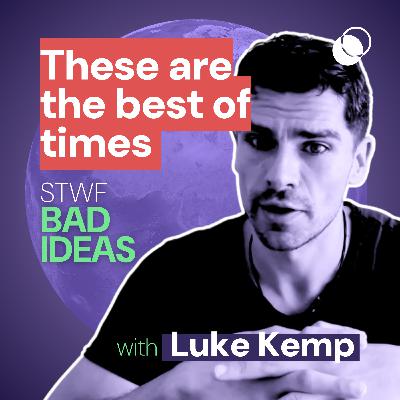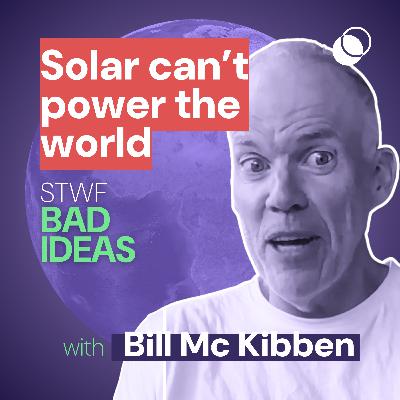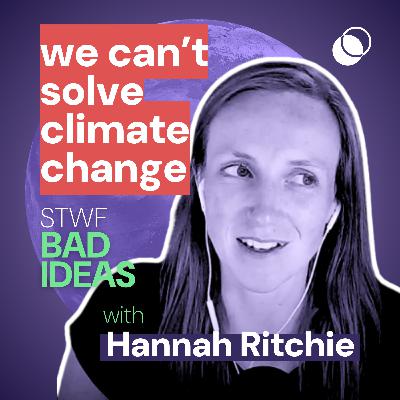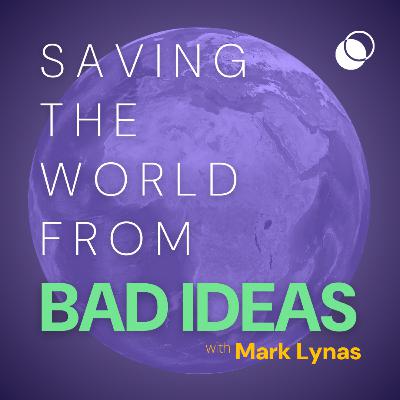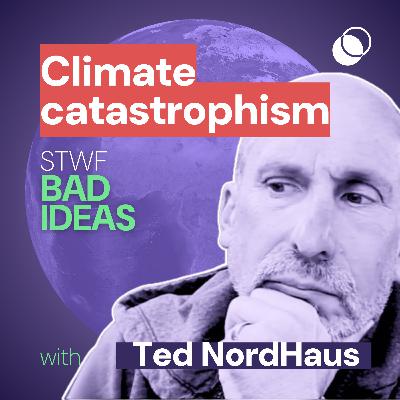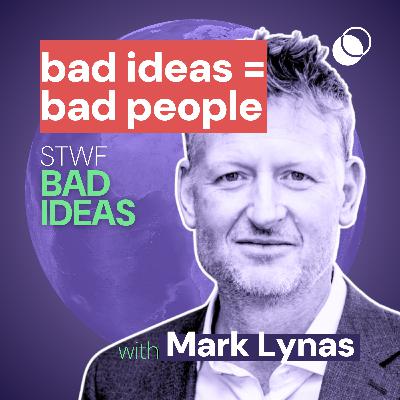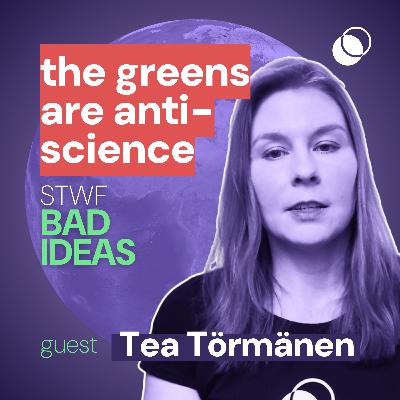Discover Saving the World From Bad Ideas
Saving the World From Bad Ideas

Saving the World From Bad Ideas
Author: WePlanet
Subscribed: 23Played: 315Subscribe
Share
© WePlanet
Description
a WePlanet podcast.
The world is shaped by ideas—some good, some bad, and some that seemed good at the time.
This is a podcast about rethinking the things we take for granted, challenging sacred cows, and admitting when we’ve been wrong.
With your host, awarded environmental author and activist Mark Lynas, we take a deep dive into the environmental, political, and social debates shaping our future—without the outrage, tribalism, or easy answers.
Help us save the world from bad ideas. Because the future depends on us getting it right.
The world is shaped by ideas—some good, some bad, and some that seemed good at the time.
This is a podcast about rethinking the things we take for granted, challenging sacred cows, and admitting when we’ve been wrong.
With your host, awarded environmental author and activist Mark Lynas, we take a deep dive into the environmental, political, and social debates shaping our future—without the outrage, tribalism, or easy answers.
Help us save the world from bad ideas. Because the future depends on us getting it right.
39 Episodes
Reverse
Is the 1.5°C temperature target helping or hindering climate action? In this episode of Saving the World from Bad Ideas, Mark Lynas sits down with his co-authors Kwesi Quagraine (climate scientist at NCAR) and Erle Ellis (professor at University of Maryland Baltimore County) to discuss their groundbreaking new paper published in Nature that proposes a complete rethinking of how we measure climate progress.The team argues that global average temperature targets — the organizing principle of climate policy since Paris 2015 — are intangible, unactionable, and increasingly counterproductive now that we've essentially crossed the 1.5°C threshold. Instead, they propose the Clean Energy Shift (CES) — a simple, measurable metric that tracks how fast clean energy is displacing fossil fuels in real time.🧠 Topics Discussed: 🌡️ Why global average temperature targets are intangible and don't translate into clear policy actions🔢 The problem with "1.5 to stay alive": What happens when you cross a threshold framed as a limit of safety?📊 Introducing the Clean Energy Shift (CES): Growth rate of clean energy minus growth rate of total energy demand🔌 Why clean energy is now the cheapest option in most developing countries🌍 How regional climate impacts differ dramatically from global average temperature (Africa vs Europe vs small islands)🎯 Why "percent clean energy" should replace temperature as our north star metric (aiming for 100%)📉 The challenge of measuring energy: Primary vs useful energy, and why efficiency gains complicate the numbers⚡ Heat pumps, electric vehicles, and electrification: 💡 Why clean energy shift creates positive competition between countries (not just climate guilt)🗳️ Why clean energy targets need to enter UNFCCC discussions alongside temperature goals🔬 The data challenge: Why IEA and others need to release standardized, open-access energy data📐 The paradox of our time: Passing "safety limits" while developing real solutions🔭 The narrative shift from "avoid catastrophe" to "build clean energy abundance"👨🏫 Guest Bios:Kwesi Quagraine is a climate scientist at NCAR (National Center for Atmospheric Research) and former senior lecturer at the University of Cape Coast, Ghana, where he taught physics, meteorology, and atmospheric science. Originally from Ghana, Kwesi brings vital perspectives on how climate policy impacts developing nations and expertise in climate modeling, including solar radiation management research.Erle Ellis is a professor of geography and environmental systems at the University of Maryland Baltimore County. His work with the United Nations Development Program's Human Development Report focuses on aspirational indicators for making a better future. Erle has spent decades studying global environmental change and teaching students how human societies interact with planetary systems.📚 Recommended Reading & Resources:● The Clean Energy Shift paper — Quagraine, Ellis, Lynas et al. (Nature, 2025) https://www.nature.com/articles/d41586-026-00246-z● Michael Liebreich — "The Pragmatic Climate Reset" essay Part 1 / Part 2● EMBER energy data and analysis https://ember-climate.org● International Energy Agency (IEA) energy statistics https://www.iea.org/data-and-statistics● Mark Lynas — Six Degrees: Our Future on a Hotter Planet https://www.marklynas.org/books/six-degrees/● WMO (World Meteorological Organization) temperature data https://wmo.int/topics/climate● Paris Agreement (2015) — text and NDC framework https://unfccc.int/process-and-meetings/the-paris-agreement🌐 About WePlanet:WePlanet is a global citizen and science movement challenging bad ideas and championing evidence-based solutions for climate, nature, and human progress. Learn more at weplanet.org📥 Join the Conversation💬 Feedback or questions? Email: podcast@weplanet.org📩 Subscribe to new episodes: weplanet.org/podcast👁️ Follow us on X/Twitter: @weplanetint
Is “degrowth” a noble environmental solution — or one of history’s truly terrible ideas? In this episode of Saving the World from Bad Ideas, Mark Lynas sits down with Adam Dorr, Director of Research at RethinkX and author of The Degrowth Delusion: Dispelling One of History’s Truly Terrible Ideas.Dorr argues that degrowth — the increasingly popular environmental movement calling for economic contraction — meets every criterion of a “Truly Terrible Idea”: it sounds virtuous, promises the moon, spreads easily, appeals especially to the young, and catastrophically backfires when implemented.Mark and Adam explore why degrowth misunderstands economic growth itself, why material “stuff” is not the same as value, how technological progress consistently decouples prosperity from environmental harm, and why shrinking the global economy could never solve climate change — and would instead cause mass deprivation, collapse, and tyranny.If you’ve ever heard the phrase “you can’t have infinite growth on a finite planet,” this conversation will challenge your assumptions. And it lays the groundwork for next episode’s deep dive into the optimistic, data-driven alternative: a future where humanity and nature both thrive.🧠 Topics Discussed:💡 What makes an idea a “Truly Terrible Idea” (TTI) — and why degrowth qualifies🌍 Why degrowth’s core logic (“too many people consuming too much”) is seductive but false📉 Why “infinite growth on a finite planet” misunderstands value, not stuff🐎 How technological progress (e.g., cars replacing horses, digital replacing film) eliminates old harms🔌 Why degrowth would block the very innovations (solar, EVs, biotech) that solve environmental problems🔥 The “house on fire” analogy: why reducing emissions 50% still leaves the house burning📉 GDP vs wellbeing: is economic growth actually correlated with human development?🌐 Why degrowth is a luxury belief seldom embraced by people who’ve experienced real poverty😡 The role of resentment, pessimism and misanthropy in the appeal of degrowth🏛️ Why degrowth requires authoritarian state control and cannot be implemented democratically🤝 The win–win path: how technology enables prosperity and ecological restoration🔭 Why environmentalism desperately needs a credible, optimistic, tech-enabled vision of the future👨🏫 Guest Bio:Adam Dorr is the Director of Research at RethinkX, a nonprofit think tank analyzing how new technologies disrupt existing systems. He is the lead author of The Degrowth Delusion, a sweeping critique of degrowth ideology and a roadmap for a technologically enabled, sustainable future. Dorr’s work spans energy, food, transportation, and long-term civilizational pathways.📚 Recommended Reading & Resources: ● The Degrowth Delusion — Adam Dorr ● RethinkX research reports (energy, food, transport disruptions) ● Studies on GDP vs Human Development Index (UNDP) ● The Limits to Growth: Malthus and the Classical Economists ● Steven Pinker — Enlightenment Now ● Literature on zero-sum vs non-zero-sum thinking💬 Quote Highlights:“Truly terrible ideas don’t die out on their own — they must be actively refuted.” — Adam Dorr“It’s not that we need to do less — it’s that we need to do better.” — Adam Dorr“There is no sustainable amount of fire. Reducing emissions by half still leaves your house burning.” — Adam Dorr“Poverty is not virtuous. It is not something to aspire to. To believe otherwise is a failure of compassion.” — Adam Dorr“Technology is the only way we have a rational, data-driven basis for optimism.” — Adam Dorr🌐 About WePlanet:WePlanet is a global citizen and science movement challenging bad ideas and championing evidence-based solutions for climate, nature, and human progress. Learn more at weplanet.org📥 Join the Conversation💬 Feedback or questions? Email: podcast@weplanet.org📩 Subscribe to new episodes: weplanet.org/podcast 👁️ Follow us on X/Twitter: @weplanetint
Welcome to season three of Saving The World From BAD IDEASBad Idea #35: ‘THIS is the Future’ Why Forecasts Fail – with David Wallace-WellsIn the season three opener of Saving the World from Bad Ideas, Mark Lynas sits down with David Wallace-Wells, New York Times columnist and author of The Uninhabitable Earth, to tackle a deceptively simple bad idea: the belief that we can predict the future with confidence.David explains how even sophisticated models can be wildly sensitive to small assumptions, drawing on examples from climate economics and the pandemic era, when many expert forecasts failed to anticipate outcomes even a couple of weeks ahead. The conversation moves from climate targets and energy transitions to the psychology of “normalisation”, the social aftershocks of COVID, and the way politics can swing dramatically with small changes in public mood.The result is a wide-ranging, clear-eyed discussion about uncertainty, risk, and how to stay serious about climate and democracy without pretending the future comes with a reliable timetable.🧠 Topics Discussed: Why long-range climate and economic modelling can hinge on fragile assumptionsWhat COVID forecasting revealed about the limits of near-term predictionHow humility about uncertainty gets weaponised by those who want inactionDavid’s shift since The Uninhabitable Earth: less apocalyptic certainty, more systems thinkingFaster-than-expected clean energy rollout, and the stubborn unknowns around fossil retirement“Normalisation” as a human superpower, and as a moral failure when disasters fade from viewThe post-pandemic social hangover: loss of trust, atomisation, and the politics of public healthVaccine backlash, the contradictions inside “anti-establishment” health coalitions, and what might endureWhy the “world is drifting inexorably right” narrative misses how messy politics really isA cautious look toward 2050: warming, geopolitics, AI hype cycles, and nuclear risk👩🏫 Guest Bio:David Wallace-Wells is a journalist, writer, and weekly columnist at The New York Times. He rose to global prominence with his 2017 essay “The Uninhabitable Earth”, later expanded into the bestselling book The Uninhabitable Earth: Life After Warming. His work spans climate change, politics, and the social consequences of crisis, including the COVID-19 pandemic.David Wallace-Wells, The Uninhabitable Earth: Life After Warming (Penguin Random House)David Wallace-Wells, “After Climate Alarmism” (New York Magazine, 2021)Martin L. Weitzman, “Fat-Tailed Uncertainty in the Economics of Catastrophic Climate Change” (Review of Environmental Economics and Policy)💬 Quote Highlights:“Everything we think we know about where we’re heading is bedevilled by epistemic problems.” David Wallace Wells“The future is more manageable than what we feared, though the system is still full of unknowns.” David Wallace Wells“We normalise a lot, and that will govern a lot of our climate future.” David Wallace Wells“Every small shift in the vibes feels permanent, until a few weeks later it doesn’t.” David Wallace Wells“Treating one percent per year as a precise forecast feels abstracted from how decisions actually get made.”David Wallace Wells🌐 About WePlanet: WePlanet is a global citizen and science movement advancing bold, evidence-based solutions for climate, nature, and prosperity. We challenge bad ideas and champion better ones, grounded in human wellbeing and ecological restoration. Learn more at weplanet.org.📥 Join the ConversationEmail: podcast@weplanet.orgSubscribe: weplanet.org/podcastFollow on X: @WePlanetInt
Is nuclear power too slow, too expensive, or too essential to ignore? In this episode of Saving the World from Bad Ideas, Mark Lynas sits down with Baroness Bryony Worthington — crossbench peer, climate policy architect, and co-host of the Cleaning Up podcast — to take on Bad Idea #34: “Nuclear? No Thanks.”🧠 Topics Discussed: ● ⚛️ Why nuclear costs haven’t fallen — and why China may change that ● 🇫🇷 What France got right (and wrong) in its Mesmer-era nuclear buildout ● 🇨🇳 China’s nuclear ecosystem: HTRs, molten salts, SMRs, and industrial policy ● 🧱 Why huge gigawatt-scale reactors fail — and when modularity matters ● 🌡️ Heat: the forgotten one-third of global energy that renewables struggle to replace ● 🇺🇸 The growing bipartisan nuclear consensus in the U.S. ● 🔥 Geothermal, CSP, and advanced drilling as zero-carbon heat sources ● 👾 AI and data centres: the quiet driver of surging electricity demand ● 🧪 Thorium, molten salt reactors, and the cult of “better nuclear” ● ♻️ Nuclear waste, fuel recycling, plutonium, and the politics of the NRC ● 🛡️ Risk, radiophobia, and why safety rules became so irrational ● 🌍 Authoritarianism, industrial strategy, and what China’s system gets right (and wrong)👩🏫 Guest Bio: Baroness Bryony Worthington is a crossbench member of the UK House of Lords and one of Britain’s most respected climate policy thinkers. She was a lead author of the UK’s Climate Change Act, co-founded the children’s environmental charity Sandbag, and serves as co-host of the global energy podcast Cleaning Up with Michael Liebreich. Bryony currently leads work on clean industrial transitions, including repowering coal infrastructure with zero-carbon heat from nuclear, geothermal, and advanced solar technologies.📚 Recommended Reading & Resources ● Cleaning Up podcast – https://www.cleaningup.live ● BloombergNEF – https://about.bnef.com ● Kairos Power (advanced reactors) – https://kairospower.com ● Oklo (fast microreactors) – https://www.oklo.com ● TerraPower (Natrium reactor) – https://www.terrapower.com ● High-temperature gas-cooled reactors (HTR info) – https://en.wikipedia.org/wiki/High-temperature_gas-cooled_reactor ● Molten salt reactor background – https://en.wikipedia.org/wiki/Molten-salt_reactor ● Tsinghua University Institute of Nuclear and New Energy Technology – https://www.inet.tsinghua.edu.cn/ineten/ ● Repower Initiative – https://www.repower.world/ ● Jamie Beard on geothermal – https://www.texasgeo.org ● IAEA on nuclear fuel recycling – https://www.iaea.org/topics/spent-fuel-management ● Waste Not (WePlanet nuclear fuel recycling report) – https://www.weplanet.org/reports/waste-not ● China’s solar overcapacity & exports – https://ourworldindata.org/renewable-energy ● Our World in Data: electricity mix – https://ourworldindata.org/electricity-mix 💬 Quote Highlights:“Once you build nuclear, you never regret it — it just quietly produces heat and power for 80 years.” “China has already built almost everything we were going to tell them to try.” “Heat is a third of global energy. Batteries can’t solve that. Nuclear can.” “Radiation is everywhere — from rocks, from the sun, from your partner in bed. We’ve regulated nuclear as if none of this exists.” “I’m not pro-nuclear everywhere. I’m pro-nuclear where it makes the transition faster.” “I’m a pro-humanity environmentalist. Nuclear is part of that story.”🌐 About WePlanet: WePlanet is a global citizen and science movement challenging bad ideas and championing evidence-based solutions for climate, nature, and human well-being. Learn more at https://weplanet.org📥 Join the Conversation 💬 Feedback or questions? Email: podcast@weplanet.org 📩 Subscribe to new episodes: https://weplanet.org/podcast 👁️ Follow us on X/Twitter: https://twitter.com/weplanetint
🔍 Episode Summary:Is the food industry slowly killing us? Is processing of food the problem? Do we really need personalized nutrition? In this episode of Saving the World from Bad Ideas, Mark Lynas sits down with Professor Sarah Berry — nutritional scientist and Chief Scientist at ZOE — to take on Bad Idea #33: “Ultra Processed Foods are killing us”From the gut microbiome to micronutrients, ultra-processed foods, polyphenols, insulin resistance, fats, carbs, and the myth of the “perfect diet,” Sarah explains why individuals respond so differently to the same foods — and why population-level dietary guidelines often fail to deliver.They dig into the largest personalised nutrition study in the world, break down the science behind metabolic health, explore why the food environment keeps pushing us toward unhealthy choices, and examine how AI, big data, and microbiome analysis could revolutionise how we think about food.🧠 Topics Discussed: ● 🧬 Why one-size-fits-all nutrition fails ● 🍽️ What personalised nutrition actually means (and doesn’t mean) ● 🧪 The PREDICT studies — the world’s largest personalised nutrition programme ● 🦠 Gut microbiome diversity: why it matters ● 🔬 Ultra-processed food: what the science really shows ● 🧁 Why sugar behaves differently in different bodies ● 🧂 Salt, fats, omega-3s, fibre, polyphenols — a practical breakdown ● 🧠 Why “calories in, calories out” isn’t enough ● 🏥 Why metabolic health is declining (and what to do about it) ● 🧘 How sleep, stress, and exercise influence food responses ● 🤖 How AI and microbiome data could shape the future of nutrition👩🏫 Guest Bio: Professor Sarah Berry is a nutritional scientist at King’s College London and the Chief Scientist at ZOE, where she leads research on personalised nutrition, metabolic health, and the gut microbiome. She is one of the lead scientists behind the PREDICT studies — the world’s largest programme looking at individual responses to food — and has authored more than 200 peer-reviewed publications. Sarah is a leading communicator on evidence-based nutrition and co-hosts the ZOE Science & Nutrition podcast.📚 Recommended Reading & Resources ● ZOE personalised nutrition programme – https://joinzoe.com ● PREDICT 1 study – https://www.nature.com/articles/s41591-020-0934-0 ● Professor Sarah Berry (King’s College London profile) – https://www.kcl.ac.uk/people/sarah-berry ● ZOE Science & Nutrition podcast – https://zoe.com/learn/podcast ● Tim Spector’s work on the microbiome – https://www.tim-spector.co.uk ● Ultra-processed foods overview (WHO) – https://www.foodnavigator.com/Article/2025/06/19/who-ultra-processed-food-guidance/ ● Our World in Data: Diet & Obesity – https://ourworldindata.org/diet-compositions ● Meta-analysis on glycaemic variability & health – https://pubmed.ncbi.nlm.nih.gov/31220802 ● The Nurses Health Study – https://nurseshealthstudy.org/ ● Gut microbiome science summary (Microbiome Journal) – https://microbiomejournal.biomedcentral.com💬 Quote Highlights:“There is no perfect diet — there is only the best diet for you.” — Sarah Berry “Two people eating the same muffin can have completely opposite metabolic responses.” — Sarah Berry “We’ve been telling people what to eat for decades. It hasn’t worked. We need a new approach.” — Sarah Berry “Ultra-processed doesn’t always mean unhealthy — but most of what’s on shelves today definitely is.” — Sarah Berry “We cannot separate nutrition from sleep, stress, and movement. They’re part of the same system.” — Sarah Berry🌐 About WePlanet: WePlanet is a global citizen and science movement challenging bad ideas and championing evidence-based solutions for climate, nature, and human well-being. Learn more at https://www.weplanet.org📥 Join the Conversation 💬 Feedback or questions? Email: podcast@weplanet.org 📩 Subscribe to new episodes: https://weplanet.org/podcast 👁️ Follow us on X/Twitter: https://twitter.com/weplanetint
Is a world powered by clean energy possible without nuclear power? In this episode of Saving the World from Bad Ideas, Mark Lynas sits down with Julia Pyke, Managing Director of Sizewell C, to challenge Bad Idea #32: “We don’t need nuclear.”From financing and grid stability to biodiversity and public opinion, Julia explains why nuclear is essential to reaching net zero — and why the UK’s new fleet of reactors could reduce consumer bills, not raise them. They discuss the economics of megaprojects, how to avoid first-of-a-kind overruns, the role of heat in decarbonisation, small modular reactors, and how the Sizewell C project is reshaping both the local community and the nuclear industry itself.Whether you’re a nuclear skeptic or advocate, this episode offers a rare, detailed look inside one of Europe’s biggest clean-energy projects.🧠 Topics Discussed: ● ⚛️ Bad Idea #32: “We don’t need nuclear” ● 🏗️ Why Hinkley Point C cost overruns won’t repeat at Sizewell C ● 🔧 “7,000 design changes” — and why copying Hinkley avoids them ● ⚡ How nuclear cuts system-wide grid costs ● 💸 The Regulated Asset Base (RAB) model explained simply● 🏭 Why the UK needs firm, low-carbon power alongside renewables ● 🇨🇳 China’s nuclear programme and the myth of “negative learning” ● 🌳 How Sizewell C aims to be nature positive ● 🐦 Engagement with RSPB, Wildlife Trusts & Natural England ● 👩🔧 Women in nuclear — and transforming the industry’s diversity ● 🏗️ Local jobs, apprenticeships, and long-term economic benefits ● ♨️ Using nuclear heat for direct air capture and industry ● 🌬️ Is SMR hype overshadowing big reactors? ● 🎶 The Sizewell Choir: wellbeing, culture, and community👩🏫 Guest Bio: Julia Pyke is the Managing Director of Sizewell C, the UK’s next large-scale nuclear power station. A former lawyer who helped finance Hinkley Point C, she now leads one of Europe’s biggest clean-energy projects. Julia specialises in nuclear financing, infrastructure delivery, and public communication.📚 Recommended Reading & Resources: ● Electricity Distribution Networks study: government responsehttps://www.gov.uk/government/publications/electricity-distribution-networks-study-government-response ● Aurora Energy Research (national system modelling) https://auroraer.com ● UK Government: Regulated Asset Base (RAB) model explainerhttps://www.lexology.com/library/detail.aspx?g ● Hinkley Point C project overview https://www.edfenergy.com/energy/nuclear-new-build-projects/hinkley-point-c ● Rolls-Royce SMR Programme https://www.rolls-royce-smr.com/ ● Natural England – Tony Juniper https://naturalengland.blog.gov.uk/about-natural-england/ ● Suffolk Wildlife Trust https://www.suffolkwildlifetrust.org/ ● RSPB (Royal Society for the Protection of Birds) https://www.rspb.org.uk/ 💬 Quote Highlights:“The thing that stops nuclear being built isn’t engineering — it’s financing.” — Julia Pyke “Counterintuitive as it seems, building Sizewell C reduces consumer bills.” “If we could drop Sizewell C into place without construction impacts, there’d be almost no opposition.” “Nuclear isn’t in conflict with renewables. It makes them cheaper.” “If nuclear had been built out as planned in the 1980s, we wouldn’t have global warming.” “We need nuclear that looks like the society it serves — not just white men.” “Big infrastructure can be nature positive.”🌐 About WePlanet: WePlanet is a global science and citizen movement challenging bad ideas and championing evidence-based solutions for climate, nature and human flourishing. Learn more: https://weplanet.org📥 Join the Conversation 💬 Feedback or questions? Email: podcast@weplanet.org 📩 Subscribe to new episodes: https://weplanet.org/podcast 👁️ Follow us on X/Twitter: https://twitter.com/weplanetint
Is China secretly saving the world from climate catastrophe? In this episode of Saving the World from Bad Ideas, Mark Lynas is joined by Lauri Myllyvirta, Lead Analyst and Co-Founder of the Centre for Research on Energy and Clean Air (CREA), to examine Bad Idea #31: “Climate crisis? It’s China that’s the problem!”As one of the world’s most trusted analysts on China’s energy system, Lauri explains why this narrative is outdated — and how China’s clean-energy boom has become the most important climate story on the planet.They dig into China’s extraordinary expansion of solar, wind, batteries, EVs and long-distance transmission lines; the politics behind continued coal-plant construction; the country’s dramatic air-pollution turnaround; and the global consequences if China’s emissions really have peaked.🧠 Topics Discussed: ● 🔥 The “bad idea”: China will always burn more coal ● 📉 Why China’s CO₂ emissions have been stable or declining for 18 months ● ☀️ The solar boom: 100 solar panels installed per second ● ⚡ China’s new clean electricity each year = powering the UK twice ● 🏭 Why coal plants are still being built — and why many may sit idle ● 🪫 Battery deployment hitting 100 GW, transforming grid flexibility ● 🚗 EVs: 50% of new car sales and eating into China’s oil demand ● 🛻 The rise of electric heavy trucks and buses ● 🌬️ Wind, solar and nuclear in China’s power mix ● 🌁 China’s dramatic air-quality turnaround — and the global warming side-effects ● 🌎 Why China’s decarbonisation is now shaping global energy trends ● 🐉 Geopolitics: US decline, China’s clean-tech dominance ● 📊 Data transparency in China and how Lauri tracks the numbers ● 🔋 Solar + batteries as the cheapest power in world history👨🏫 Guest Bio:Lauri Myllyvirta is the Lead Analyst and Co-Founder of the Centre for Research on Energy and Clean Air (CREA). A globally respected expert on China’s energy system, he publishes widely in international media and frequently contributes analysis to Carbon Brief. Lauri previously worked with Greenpeace and has over a decade of experience tracking air-pollution, fossil-fuel and clean-energy trends across Asia. More about Lauri’s work: ● CREA – https://energyandcleanair.org/ ● Lauri on Carbon Brief – https://www.carbonbrief.org/analysis-chinas-co2-emissions-have-now-been-flat-or-falling-for-18-months/ 📚 Recommended Reading & Resources: ● CREA – China emissions & energy analysis – https://energyandcleanair.org/ ● Lauri’s latest China emissions report – https://www.energyconnects.com/news/renewables/2025/november/china-s-september-emissions-drop-keeps-annual-decline-in-play/ ● Carbon Brief: China energy & climate coverage – https://www.carbonbrief.org/category/china/ ● Bloomberg: China’s clean-energy boom – https://www.bloomberg.com/green ● IEA World Energy Outlook – https://www.iea.org/weo ● China solar deployment data (NEA) – http://www.nea.gov.cn/ ● China EV market overview (CPCA) – https://www.cpcaauto.com/ 💬 Quote Highlights:“China’s clean-energy boom is the biggest climate story in the world right now.” — Lauri Myllyvirta “Solar additions this year alone can power the entire UK — twice.” “Electric cars in China are already cutting into oil demand.” “China has the ability to peak emissions now — the question is political, not technical.” “Air pollution improved faster in China than anyone predicted — and it shows what fast action looks like.” “China didn’t just decarbonise itself — it made clean energy cheap for the whole world.”🌐 About WePlanet: WePlanet is a global citizen and science movement challenging bad ideas and championing evidence-based solutions for climate, nature, and human development. Learn more at https://weplanet.org📥 Join the Conversation 💬 Feedback or questions? Email: podcast@weplanet.org 📩 Subscribe to new episodes: https://weplanet.org/podcast 👁️ Follow us on Twitter/X: https://twitter.com/weplanetint
Could democracy really die in America? In this episode of Saving the World from Bad Ideas, Mark Lynas speaks with Susan Stokes, Professor of Political Science at the University of Chicago and Director of the Chicago Center on Democracy, to challenge Bad Idea #30: “It can’t happen here.”Drawing on her acclaimed book The Backsliders: Why Leaders Undermine Their Own Democracies, Stokes reveals the playbook that elected leaders use to quietly erode democracy from within — the same tactics that have turned Hungary, Turkey, and Venezuela into hybrid autocracies. She and Mark discuss the United States’ alarming slide under Trump’s second term, the global rise of “backsliders,” and why inequality may be the hidden fuel of modern authoritarianism.This conversation exposes the real risks facing democratic societies — and what can still be done to save them.🧠 Topics Discussed: ● ⚖️ The Bad Idea: “It can’t happen here” — and why it already is ● 🧱 The authoritarian playbook: courts, press, civil society, universities, and elections ● 🌀 “Firehose authoritarianism” — how chaos itself becomes a political tool ● 📉 Project 2025 and the new blueprint for executive overreach ● 🧮 How Bright Line Watch measures democratic decline ● 💰 The root cause: why inequality erodes democratic resilience ● 🌍 Why backsliding happens in both rich and poor countries ● 🧠 Right-wing ethno-nationalism vs. left populism — different faces, same logic ● 🎓 Why the educated elite have lost touch with working-class voters ● 🗳️ What Sweden and Brazil can teach us about democratic survival ● 🔮 Can the U.S. still hold a free election — or is this democracy’s last chapter?👩🏫 Guest Bio: Susan Stokes is the Tiffany and Margaret Blake Distinguished Service Professor of Political Science at the University of Chicago, where she directs the Chicago Center on Democracy. Her work focuses on democratic accountability, political participation, and comparative politics.She is the author of The Backsliders: Why Leaders Undermine Their Own Democracies (Princeton University Press, 2024), which explains how elected leaders across the world — from the U.S. to Hungary to India — erode democracy from within. Stokes also co-founded Bright Line Watch, a project monitoring the health of American democracy through expert and public surveys.📚 Recommended Reading & Resources: ● The Backsliders: Why Leaders Undermine Their Own Democracies – Susan C. Stokes ● Bright Line Watch – Ongoing surveys tracking the state of U.S. democracy ● Chicago Center on Democracy – University of Chicago research initiative ● The Precipice – Toby Ord ● Freedom House: Nations in Transit – Annual global democracy report ● V-Dem Institute – Democracy indices and data ● Project 2025 – The conservative blueprint shaping U.S. governance💬 Quote Highlights:“We live in a country where the government acts like an autocracy — and the people still act like it’s a democracy.” — Susan Stokes “Autocracy doesn’t arrive with a coup. It arrives through the ballot box.” “Income inequality is democracy’s most powerful poison.” “The courts, the press, the universities — they’re always the first targets.” “Democracy dies not with a bang, but with a thousand executive orders.” “If you invest in reducing inequality, you’re investing in democratic survival.”🌐 About WePlanet: WePlanet is a global citizen and science movement challenging bad ideas and championing evidence-based solutions for climate, nature, and human development. Learn more at https://weplanet.org📥 Join the Conversation 💬 Feedback or questions? Email: podcast@weplanet.org 📩 Subscribe to new episodes: https://weplanet.org/podcast 👁️ Follow us on Twitter/X: https://twitter.com/weplanetint
Is net zero possible — and what’s really holding us back? In this second part of his conversation with Mark Lynas, clean energy expert Michael Liebreich dives deep into the technologies, policies, and economics of the energy transition. Together they explore Bad Idea #29: “The Green transition is failing.”Liebreich, founder of Bloomberg New Energy Finance and host of the Cleaning Up podcast, challenges magical thinking in climate policy and explains why achieving net zero demands realism, not slogans. From grid build-out and nuclear revival to hydrogen hype and global energy justice, this episode tackles the messy, pragmatic side of decarbonisation — and why optimism grounded in physics, finance, and fairness is our best bet for a sustainable future.🧠 Topics Discussed:● ⚡ The myth of an easy energy transition ● 🌍 Global energy inequality and why the Global South matters ● ☢️ The comeback of nuclear and the politics of fear ● 🔋 The limits of batteries and why grids need diversity ● 🌬️ Wind, solar, and the real bottlenecks of scaling clean power ● 🛢️ Fossil fuel phase-out: economics vs. ideology ● 🧮 The physics of net zero and why “energy realism” matters ● 💰 How finance, markets, and policy must align for decarbonisation ● 🚀 Why clean energy innovation — not austerity — is the path forward👨🏫 Guest Bio:Michael Liebreich is the founder of Bloomberg New Energy Finance (BNEF), a leading provider of strategic research on the energy transition, and host of the influential podcast Cleaning Up. A former Olympic skier, investor, and advisor to the UK government on clean growth, Liebreich is known for his pragmatic, data-driven approach to climate and energy issues. Follow him on X/Twitter: @MLiebreich📚 Recommended Reading & Resources:● Bloomberg New Energy Finance – Market intelligence on the global energy transition ● Cleaning Up Podcast – Conversations with leaders in clean energy and climate policy ● The Liebreich Lecture (London Climate Week) – Annual keynote on energy and sustainability ● Mission Innovation – International initiative to accelerate clean energy innovation ● International Energy Agency (IEA) Net Zero Roadmap – Data and analysis on pathways to global net zero ● WePlanet – Global citizen movement advocating evidence-based solutions for climate and development💬 Quote Highlights:“Physics doesn’t negotiate. You can’t get to net zero by passing a law — you have to build stuff.” — Michael Liebreich“The energy transition is happening, but it’s not happening fast enough — and not fairly enough.” — Michael Liebreich“We need to be hard-headed about technology, but soft-hearted about people.” — Michael Liebreich🌐 About WePlanet:WePlanet is a global citizen and science movement challenging bad ideas and championing evidence-based solutions for climate, nature, and human development.📥 Join the Conversation:💬 Feedback or questions? Email: podcast@weplanet.org 📩 Subscribe to new episodes: weplanet.org/podcast 👁️ Follow us on X/Twitter: @weplanetint
Are sharks really the monsters we’ve been taught to fear — or the ocean’s misunderstood guardians? In this episode, Mark Lynas sits down with Arzucan “Zuzu” Askin, National Geographic Explorer, conservation scientist, and co-founder of Miyaru NGO, to take on Bad Idea #28: “Jaws - aka sharks are scary”From diving daily with tiger sharks in the Maldives to pioneering the world’s first free-swimming shark ultrasounds, Zuzu shares what it’s really like to live and work among these ancient predators — and why our fear of them is one of conservation’s biggest barriers. 🧠 Topics Discussed: ● 🦈 The myth of the “man-eater”: why sharks aren’t scary, they’re essential ● 🎬 Jaws and how a single movie reshaped global shark perceptions ●🏝️ How the Maldives became the “Galápagos of the Indian Ocean” for sharks ● 🌊 The 2010 Maldives shark sanctuary — and how it saved populations ● 🤰 “Mama Shark”: the world’s first free-swimming ultrasound scans of tiger sharks ● 👩🔬 Shark pregnancies and live births — motherhood in the deep ● ⚖️ The fight to stop the return of shark fishing in the Maldives ● 🧴 Hidden sharks: in cosmetics, pet food, and even vaccines● 🧠 How sharks inspire biomedical and design innovation● 🐋 Collaborating with Dr. Sylvia Earle and Tongan scientists on whale research ● 🧩 What individuals can do to protect sharks — from banning fins to consumer choices👩🏫 Guest Bio: Arzucan “Zuzu” Askin is a conservation scientist, diver, and National Geographic Explorer based in the Maldives. She co-founded Miyaru NGO, the country’s first national-level shark conservation organisation, dedicated to protecting predatory shark species through research, education, and community engagement. Zuzu led the groundbreaking “Mama Shark” project, conducting the world’s first free-swimming ultrasounds on tiger sharks to study reproduction. She has worked with National Geographic, the Maldives Ocean Alliance, and partnered with researchers like Dr. Sylvia Earle to advance ocean science and storytelling.📚 Recommended Reading & Resources: ● 🌐 Miyaru NGO – https://miyaru.org/ ● 📄 Ultrasound Scanning of Free-Swimming Tiger Sharks – Frontiers in Marine Science (2023) – https://www.frontiersin.org/journals/marine-science/articles/10.3389/fmars.2024.1500176/full ● 🐋 Mission Blue – https://missionblue.org/ ● 🧬 Blue Marine Foundation – https://www.bluemarinefoundation.com/ ● 🌊 Maldives Resilient Reefs – https://maldivesresilientreefs.com/ ● ✍️ Petition to Save the Maldives Shark Sanctuary – https://only.one/act/maldives-sharks ● 🎥 Jaws (1975) – https://en.wikipedia.org/wiki/Jaws_(film) ● 🧴 Hidden Shark Ingredients – https://sharkallies.com/blogs/shark-allies-news/squalene ● 🧠 Sylvia Earle – https://missionblue.org/team/dr-sylvia-earle/ ● 🐳 Humpback Whale Research Project (Tonga) – https://www.researchgate.net/publication/237530779_Humpback_Whales_in_Tonga_An_Economic_Resource_for_Tourism 💬 Quote Highlights:“A lion would never let you do what a tiger shark lets you do underwater.” — Arzucan “Zuzu” Askin “When you show a shark as a mother, not a monster, people see them differently.” “Sharks are older than trees — and we’ve managed to wipe out most of them in a century.” “Europe is still one of the biggest exporters of shark fins and meat. That has to stop.” “If you’ve used sunscreen, cosmetics, or pet food today, you might have already used shark.” “An ultrasound image of a pregnant tiger shark — that’s conservation storytelling at its best.”🌐 About WePlanet: WePlanet is a global citizen and science movement challenging bad ideas and championing evidence-based solutions for climate, nature, and human development. Learn more at https://weplanet.org📥 Join the Conversation: 💬 Feedback or questions? Email: podcast@weplanet.org 📩 Subscribe to new episodes: https://weplanet.org/podcast 👁️ Follow us on Twitter/X: https://twitter.com/weplanetint
Can thinking about the end of the world make us better people? In this episode of Saving the World from Bad Ideas, Mark Lynas sits down with philosopher and existential risk researcher Dr SJ Beard to unpack Bad Idea #27: “There’s no hope for humanity’”Drawing on their new book Existential Hope (Polity), SJ argues that we need to look beyond fear and fatalism to build a future worth surviving for. They explore how the same forces driving environmental destruction, inequality, and technological danger also threaten humanity’s long-term survival — and how rediscovering our shared humanity could be the key to building resilience and hope in an age of crisis.🧠 Topics Discussed: ● 🌍 Why the same systems that harm people and planet now endanger our collective future ● 🧠 What “existential risk” really means — and why it’s about justice as much as survival ● 🏭 How extractive capitalism links everyday harm to global catastrophe ● 🤖 AI, technology, and the ethics of progress ● 💣 The limits of doom thinking and why apocalypse narratives can paralyse us ● 💡 The concept of existential hope — a practical philosophy for long-term survival ● ✊ Building solidarity, moral courage, and collective action as the real foundations of safety ● 🌱 Why saving humanity starts with saving our humanity👨🏫 Guest Bio:Dr SJ Beard is a philosopher and senior research associate at the Centre for the Study of Existential Risk (CSER) at the University of Cambridge. Their research explores the ethics of global catastrophic and existential risks — from AI and climate change to inequality and social justice. SJ’s new book, Existential Hope (Polity, 2024), argues that the same human capacities that create danger also give us the tools to survive and flourish. They are known for bringing humanity, empathy, and philosophical depth to one of the most urgent topics of our time.📚 Recommended Reading & Resources: ● Existential Hope – https://www.sjbeard.com/existential-hope.html ● Centre for the Study of Existential Risk (CSER), University of Cambridge – https://www.cser.ac.uk/ ● CSER Podcast: Existential Hope and Risk – https://www.cser.ac.uk/work/24-october-2025-conversations-on-existential-hope/ ● The Precipice by Toby Ord – https://en.wikipedia.org/wiki/The_Precipice:_Existential_Risk_and_the_Future_of_Humanity ● Our Final Hour by Martin Rees – https://en.wikipedia.org/wiki/Our_Final_Hour ● Climate Endgame (PNAS, 2022) – https://www.pnas.org/doi/10.1073/pnas.2108146119 ● Effective Altruism Forum: Existential Hope and Moral Progress – https://forum.effectivealtruism.org 💬 Quote Highlights:“If we want to save humanity, we need to start by saving our humanity.” — SJ Beard “The same extractive systems that harm people and planet now are the ones that endanger our future as a species.” “Existential hope isn’t utopian — it’s pragmatic. It’s about building the moral and collective capacity to survive.” “Thinking about extinction isn’t just about avoiding the end; it’s about imagining a future worth existing in.”🌐 About WePlanet:WePlanet is a global citizen and science movement challenging bad ideas and championing evidence-based solutions for climate, nature, and human development. Learn more at https://weplanet.org📥 Join the Conversation 💬 Feedback or questions? Email: podcast@weplanet.org 📩 Subscribe to new episodes: https://weplanet.org/podcast 👁️ Follow us on Twitter/X: https://twitter.com/weplanetint
Can we inoculate society against misinformation? In this episode of Saving the World from Bad Ideas, Mark Lynas sits down with Professor Sander Vanderlinden — social psychologist at the University of Cambridge and author of Foolproof: Why Misinformation Infects Our Minds and How to Build Immunity — to take on Bad Idea #26: “Misinformation is just people being wrong on the internet.” They explore how false and misleading information spreads, why even credible institutions sometimes get things wrong, and what we can do to build mental immunity. From fake news to populism, pandemics to AI, this conversation dives deep into the psychology, politics, and future of truth itself.🧠 Topics Discussed: ● 🧩 What counts as “misinformation” — and why intent matters ● 🧠 How our brains are wired to believe and share bad information ● 🧾 The difference between misinformation and disinformation ● 🌡️ COVID-19, lab leaks, and how science self-corrects ● 📺 The weaponization of “fake news” and authoritarian censorship ● 🧍♀️ Why polarization and inequality make us more vulnerable to lies ● 📱 How social media algorithms reward outrage and extremism ● 🤖 AI, deepfakes, and the next frontier of disinformation ● 💡 Prebunking and “psychological inoculation” — how to fight back ● 🧘 The power of intellectual humility and open-minded thinking👨🏫 Guest Bio:Professor Sander Vanderlinden is Professor of Social Psychology in Society at the University of Cambridge and Director of the Cambridge Social Decision-Making Lab. His research explores the psychology of misinformation, polarization, and belief formation. He authored the bestselling book Foolproof: Why Misinformation Infects Our Minds and How to Build Immunity (2023) and co-authored The Psychology of Misinformation (2024). His work has been featured by the WHO, the UN, and major media worldwide.📚 Recommended Reading & Resources: ● Foolproof: Why Misinformation Infects Our Minds and How to Build Immunity – https://www.penguinrandomhouse.com/books/708295/foolproof-by-sander-van-der-linden/ ● The Psychology of Misinformation – https://www.cambridge.org/core/books/psychology-of-misinformation/2FF48C2E201E138959A7CF0D01F22D84 ● Cambridge Social Decision-Making Lab – https://www.sdmlab.psychol.cam.ac.uk/ ● Inoculation Science Project – https://inoculation.science ● Bad News Game –https://www.sdmlab.psychol.cam.ac.uk/research/bad-news-game ● Go Viral! Game (WHO x Cambridge) – https://www.who.int/news/item/23-09-2021-what-is-go-viral ● Cranky Uncle Game (by John Cook) – https://crankyuncle.com/game/ ● “Climate Endgame” (PNAS, 2022) – https://www.pnas.org/doi/10.1073/pnas.2108146119 ● European Digital Services Act – https://prighter.com/digital-governance/eu-dsa/ ● UK Online Safety Act – https://www.gov.uk/government/publications/online-safety-act-explainer/online-safety-act-explainer 💬 Quote Highlights:“Misinformation isn’t just about being wrong — it’s about being misled.” — Sander Vanderlinden “Science can make mistakes, but it self-corrects. Disinformation never does.” “Populism feeds off distrust. Once institutions lose credibility, facts don’t matter anymore.” “We’ve known for thousands of years what misleading rhetoric looks like — Aristotle warned us about it.” “You can’t fact-check your way out of this crisis. We need to inoculate minds, not just correct them.”🌐 About WePlanet: WePlanet is a global citizen and science movement challenging bad ideas and championing evidence-based solutions for climate, nature, and human development. Learn more at https://weplanet.org📥 Join the Conversation: Feedback or questions? Email: podcast@weplanet.org Subscribe to new episodes:https://weplanet.org/podcast Follow us on Twitter/X: https://twitter.com/weplanetint
🔍 Episode Summary:Is green hydrogen the silver bullet for decarbonisation — or a trillion-dollar distraction? In this episode of Saving the World from Bad Ideas, Mark Lynas is joined by energy analyst, investor, and podcaster Michael Liebreich to unpack Bad Idea #24: “We’ll just use Hydrogen!” Liebreich, founder of Bloomberg New Energy Finance and co-host of the Cleaning Up podcast, makes the provocative case that green hydrogen is over-hyped, fundamentally flawed as a fuel, and destined to remain a niche solution rather than the backbone of a “hydrogen economy.” Together they explore the physics, economics, and politics of hydrogen — why hype keeps returning in 20-year cycles, what role hydrogen can play in industry and fertilisers, and why pragmatism, not techno-fantasy, must drive climate strategy.🧠 Topics Discussed: ● 💧 Why hydrogen is a “really crappy fuel” — and the laws of thermodynamics make it costly ● 📉 The difference between green, blue, grey, turquoise, and pink hydrogen ● 🏭 Current global hydrogen use: 100m tonnes/year, and why 0.1% is green ● 🚢 Why shipping liquid hydrogen is nearly impossible (density, leakage, energy loss) ● 💸 Hydrogen’s “missing trillions”: the cost gap with grey hydrogen ● 🛩️ Europe’s RED III mandate and the looming cost inflation in aviation fuels ● 🚛 Why trucks, steel, and shipping are unlikely to go hydrogen ● 🔋 The rise of electric trucks, batteries, and the hydrogen ladder framework ● ⚖️ Pragmatism vs. hype: why chasing bad ideas risks a climate backlash ● 🐢 The “Pragmatic Climate Reset”: think like a tortoise, not a hare👨🏫 Guest Bio: Michael Liebreich is founder of Bloomberg New Energy Finance, managing partner of EcoPragma Capital, and CEO of Liebreich Associates. A former Olympic skier, he is now one of the world’s leading clean-energy analysts. He is also co-host of the podcast Cleaning Up. His influential “Hydrogen Ladder” has shaped debate about where hydrogen makes sense — and where it doesn’t. Michael also writes extensively at Liebreich Associates Essays.📚 Recommended Reading & Resources: ● Michael Liebreich – The Hydrogen Ladder ● Michael Liebreich – The Missing Trillions of Hydrogen ● Michael Liebreich – The Pragmatic Climate Reset (Part I & II) ● Hydrogen Economy – Jeremy Rifkin (2002) ● The Future of Hydrogen – IEA report (2019) ● TNO study on hydrogen costs – https://www.tno.nl/en/newsroom/2022/03/green-hydrogen-production-costs/ ● European RED III Directive – https://energy.ec.europa.eu/topics/renewable-energy/renewable-energy-directive-targets-and-rules_en● Porsche synthetic fuels project, Chile – https://newsroom.porsche.com/en/2022/company/porsche-chile-haru-oni-efuels-pilot-plant-26823.html💬 Quote Highlights:“Hydrogen is the Swiss Army knife of energy — there’s almost always something cheaper, safer, and more convenient.” — Michael Liebreich “If you care about the climate, the cleanest kilo of hydrogen is the one you never make.” — Michael Liebreich “For every $1/kg cost gap, hydrogen needs $100 billion per year in subsidies. That’s the missing trillions.” — Michael Liebreich“Politicians love hydrogen because it’s a get-out-of-jail-free card. But hype doesn’t change physics.” — Michael Liebreich “Think like a tortoise, not like a hare: go steady, pragmatic, and win the race.” — Michael Liebreich🌐 About WePlanet: WePlanet is a global citizen and science movement challenging bad ideas and championing evidence-based solutions for climate, nature, and human development. Learn more at https://weplanet.org📥 Join the Conversation 💬 Feedback or questions? Email: podcast@weplanet.org 📩 Subscribe to new episodes: https://weplanet.org/podcast 👁️ Follow us on Twitter/X: https://twitter.com/weplanetint
🔍 Episode Summary Is civilisation inherently self-destructive? In this episode of Saving the World from Bad Ideas, Mark Lynas is joined by political scientist and existential risk researcher Dr Luke Kemp to tackle Bad Idea #23 "These are the best of times"Luke unpacks what history really tells us about the fate of past societies — and how those lessons do (and don’t) apply to today’s global risks like climate change, nuclear war, and AI. They explore the role of complexity, fragility, and inequality in collapse, and why we need to reject fatalism to build resilience and renewal instead.From ancient Rome to modern techno-capitalism, this episode explores whether doom is destiny — or a bad idea we need to outgrow.🧠 Topics Discussed ● 📜 What “collapse” actually means, and why it’s more often transformation ● 🏛️ Why Rome never really “fell” — and neither did most civilisations ● 🌍 Global risks vs. local collapses: what makes our world different ● 🔁 The role of feedback loops, fragility, and complexity ● 🌡️ Why climate change is a multiplier of collapse, not the root cause ● 💣 Nuclear war, AI, and engineered pathogens as existential risks ● 🤖 Why AI doom scenarios may be overhyped (and misdirected) ● 🧠 “Collapsology,” survivalism, and the new secular eschatologies ● 🌱 What real resilience looks like: democracy, equity, adaptability ● 🧘♀️ Why pessimism is lazy — and optimism is an active choice👨🏫 Guest BioDr Luke Kemp is a political scientist and risk researcher at the University of Adelaide and the University of Cambridge's Centre for the Study of Existential Risk. He co-led the influential 2022 paper Climate Endgame and has written widely on societal collapse, risk cascades, and global futures. A former adviser to the Australian government, Luke specialises in the intersection of history, complexity science, and future risk. His current work focuses on resilience and renewal in the face of polycrisis.📚 Recommended Reading & Resources ● 📝 Climate Endgame (2022 paper) – https://www.pnas.org/doi/10.1073/pnas.2204269119 ● 🌐 Centre for the Study of Existential Risk (CSER) – https://www.cser.ac.uk ● 🧠 Luke Kemp research profile – https://researcher.sydney.edu.au/researcher/51183 ● 📖 Jared Diamond – Collapse: How Societies Choose to Fail or Succeed – https://en.wikipedia.org/wiki/Collapse:_How_Societies_Choose_to_Fail_or_Succeed ● 📖 Joseph Tainter – The Collapse of Complex Societies – https://en.wikipedia.org/wiki/The_Collapse_of_Complex_Societies ● 📖 Kyle Harper – The Fate of Rome – https://press.princeton.edu/books/paperback/9780691192062/the-fate-of-rome ● 📘 Our Final Hour – Martin Rees – https://www.basicbooks.com/titles/martin-rees/our-final-hour/9780465068630/ ● 📗 The Precipice – Toby Ord – https://www.hachettebookgroup.com/titles/toby-ord/the-precipice/9780316484911/ ● 🎧 Collapse: The End of Everything (podcast series) – https://www.bbc.co.uk/sounds/brand/m001qbpr 💬 Quote Highlights“Collapse is rarely the end — it’s usually the start of something new.” — Luke Kemp “Rome didn’t fall — it transformed over centuries. That’s not a Hollywood ending, but it’s a real one.” “Climate change is a risk multiplier, not the root cause of collapse. The real danger is fragility and inequality.” “We need to stop treating resilience like a buzzword. It’s a system of systems — democratic, equitable, adaptive.” “The biggest myth is that doom is destiny. It’s not. We have choices.”🌐 About WePlanet WePlanet is a global citizen and science movement challenging bad ideas and championing evidence-based solutions for climate, nature, and human development. Learn more at https://weplanet.org📥 Join the Conversation 💬 Feedback or questions? Email: podcast@weplanet.org 📩 Subscribe to new episodes: https://www.weplanet.org/podcast 👁️ Follow us on Twitter/X: https://twitter.com/weplanetint
🔍 Episode Summary Can the sun save civilization? In this episode of Saving the World from Bad Ideas, Mark Lynas sits down with legendary climate author and activist Bill McKibben to take on Bad Idea #22: "Solar can’t power the world." McKibben, co-founder of 350.org and Third Act, makes a powerful case for solar as our best hope to avert climate catastrophe — and explains why a rapid, global energy transformation is not only possible, but already underway. They dive into the economics of solar, the moral urgency of ditching fossil fuels, the false promise of geoengineering, and why the shift to sun and wind can unlock a fairer, more democratic world. Bill’s new book Here Comes the Sun offers both realism and hope — and in this episode, he brings that rare combination to life.🧠 Topics Discussed ☀️ Why solar energy is the most transformative and hopeful technology of our time 📉 Why fossil fuel addiction is a moral and structural tragedy — not just an economic one 🏭 The deep political resistance to renewables, especially in the U.S. 🚩China's solar supremacy and its global influence via trade networks 🐝 Agrivoltaics: how solar panels can improve yields, pollination, and biodiversity 📦 Rooftop solar, virtual power plants, and why permitting matters 💰 Why oil companies hate renewables: no repeat customers 🧠 What activism must focus on now that clean energy is cheaper than fossil 🌍 The moral and technological failure of solar geoengineering 🙏 Climate, faith, and the spiritual case for solar 🎉 “Sun day”: a nationwide celebration and call to action for clean energy in the U.S.👨🏫 Guest Bio Bill McKibben is an author, environmentalist, and founder of 350.org and Third Act. He wrote the first popular book on climate change (The End of Nature, 1989) and has spent decades on the front lines of climate activism. His newest book, Here Comes the Sun: The Last Chance for the Climate and a Fresh Chance for Civilization, blends urgent science with hope — and charts a path toward a solar-powered future. Bill teaches at Middlebury College and has been described as “America’s leading environmentalist.”📚 Recommended Reading & Resources Here Comes the Sun – Bill McKibben The End of Nature – Bill McKibben Sunday.Earth – Join Bill’s solar celebration movement 350.org – Global climate movement Third Act – Organizing older Americans for climate action Intergovernmental Panel on Climate Change (IPCC) reports IEA Reports on China’s solar exports and BYD’s global EV expansion 💬 Quote Highlights“We live on a planet where the cheapest way to make energy is to point a sheet of glass at the sun.” “Every wild natural place will be transformed by climate. The only way to save them is to power our world differently.” “Fossil fuels are expensive — in dollars, in lives, in politics. Solar is beautiful, cheap, and fair.” “You don’t have to be a sophisticated theologian to know: love your neighbour, and don’t drown them with emissions.” “Activism must now focus on speed — how fast can we make this transformation happen?”🌐 About WePlanet WePlanet is a global citizen and science movement challenging bad ideas and championing evidence-based solutions for climate, nature, and human development. Learn more at weplanet.org.📥 Join the Conversation 💬 Feedback or questions? Email: podcast@weplanet.org 📩 Subscribe to new episodes: weplanet.org/podcast 👁️ Follow us on Twitter/X: @weplanetint
🔍 Episode Summary Is it too late to stop climate change — or do we still have reasons for hope? In this episode, Mark Lynas talks with data scientist and author Hannah Ritchie, Deputy Editor of Our World in Data and author of Clearing the Air: The hopeful guide to solving climate change in 50 questions.Hannah tackles some of the biggest climate myths head-on: that we’re doomed to runaway warming, that renewables can never power the world, and that going plant-based won’t make a difference. With data-driven clarity, she explains why the transition to clean energy is moving faster than people think, how “ultra-processed” doesn’t always mean unhealthy, and why there are no deal-breakers in the fight against climate change.This conversation is both realistic and optimistic — a must-listen for anyone looking for evidence that solutions are within reach.🧠 Topics Discussed 🌍 Why we are not locked into 5–6°C of warming ⚡ The clean energy transition and the speed of solar & wind growth 🔋 How to solve renewables’ variability with storage, nuclear, and grids 🌱 Land use myths: why renewables won’t “cover the landscape” 🚗 Electric vehicles: efficiency gains and outdated myths 🥩 Meat substitutes, ultra-processed foods, and what the data actually shows 🏗 Cement, steel, and other “hard to abate” sectors ✈ Aviation’s future: biofuels, hydrogen, or carbon removal? 🌞 Solar geoengineering — risky gamble or necessary backup plan? 🌟 Why Hannah calls her book “a hopeful guide”👩🏫 Guest Bio Hannah Ritchie is Deputy Editor at Our World in Data and author of the Substack Sustainability by Numbers. Her new book Clearing the Air tackles 50 of the most common myths and half-truths about climate change with a data-driven approach. Hannah is known for making complex climate data accessible and empowering.📚 Recommended Reading & Referenced resourcesClearing the Air — Hannah RitchieNot the end of the World — Hannah RitchieOur World in Data – Climate Change CollectionSustainability by Numbers Substack — Hannah RitchieIPCC AR6 – Working Group III (Mitigation of Climate Change)Six Degrees, our final warning — Mark LynasSustainable Energy – Without the Hot Air — David MacKay💬 Quote Highlights“We are not headed for five or six degrees of warming. Every fraction of a degree we avoid reduces risk.” — Hannah Ritchie“Solar and wind are growing faster than any energy source in history. This transition can be much quicker than people think.” — Hannah Ritchie“Yes, the sun doesn’t always shine and the wind doesn’t always blow — but that’s a solvable problem.” — Hannah Ritchie“The idea that renewables will cover the landscape is just wrong. Powering a country with solar takes only a few percentage points of land.” — Hannah Ritchie"There are no deal-breakers. None of the questions I tackle suggest this is impossible — all are solvable.” — Hannah Ritchie🌐 About WePlanet WePlanet is a global citizen and science movement challenging bad ideas and championing evidence-based solutions for climate, nature, and human development. Learn more at weplanet.org.📥 Join the Conversation 💬 Feedback or questions? Email: podcast@weplanet.org 📬 Subscribe to new episodes: weplanet.org/podcast 🐦 Follow us on Twitter/X: @weplanetint
We’re back. Season 2 of Saving the World from Bad Ideas is coming — and it’s bigger, bolder, and maybe even more controversial. This time once more , we’re joined by some of the sharpest minds on the planet.🌍 Bill McKibben on activism, power, and what we’ve learned from 30 years of climate campaigning. 🧠 Hannah Ritchie returns to dismantle more doomer myths with data. 🔥 Luke Kemp on civilisational risk and collapse. ⚡ Michael Liebreich on energy transitions without fantasy thinking. 💥 Ted Nordhaus on why he's no longer a 'climate catastrophist', degrowth, and the real way forward.If you're tired of bad ideas blocking good solutions — this season is for you. Subscribe now and be ready.
🔍 Episode Summary:Is “climate catastrophism” itself a bad idea? In this episode of Saving the World from Bad Ideas, Mark Lynas is joined by longtime collaborator and eco-modernist thinker Ted Nordhaus, Executive Director of the Breakthrough Institute. Together they take on Bad Idea #21: “We must be climate catastrophists to motivate action.”Nordhaus — co-author of An Ecomodernist Manifesto — argues that apocalyptic climate narratives have backfired, fuelling political backlash and distracting from the real work of pragmatic, technology-driven decarbonisation. The pair explore what the science actually says about climate risk, why catastrophe is not inevitable, and how prosperity and resilience can coexist with climate action. It’s a provocative conversation about fear, facts, and the future — one that challenges both denialism and doomerism.🧠 Topics Discussed: ● 🌡️ What “climate catastrophism” means — and why Ted rejects it ● 📉 Why global emissions are likely to peak soon, and warming is unlikely to exceed 3°C ● 👥 How adaptation, technology, and prosperity have reduced climate vulnerability ● 🌪️ Why deaths from natural disasters are at record lows despite global warming ● 🧭 The limits of single-event attribution studies and the “50x more likely” fallacy ● 🌍 Collapse myths: why population, growth, and decarbonisation trends matter ● 🌳 The Amazon, coral reefs, and what biodiversity loss really means for humans ● 💣 Nuclear war, not climate change, as the real existential threat ● ⚙️ Why geoengineering could cause catastrophe if misused or terminated suddenly ● 🗳️ How climate catastrophism alienated working-class voters and fed political backlash ● ⚛️ Why nuclear and geothermal may be the unsung heroes of decarbonisation👨🏫 Guest Bio: Ted Nordhaus is the founder and Executive Director of the Breakthrough Institute, a California-based eco-modernist think tank pioneering pragmatic approaches to climate and energy. He co-authored An Ecomodernist Manifesto (2015) and The Death of Environmentalism (2004), which helped reshape modern environmental thinking. His work focuses on technological innovation, energy systems, and the political economy of decarbonisation.📚 Recommended Reading & Resources: ● Why I’m No Longer a Climate Catastrophist – Ted Nordhaus (2024) ● An Ecomodernist Manifesto – Ted Nordhaus, Mark Lynas et al. ● The Death of Environmentalism – Ted Nordhaus & Michael Shellenberger ● Climate Endgame – Kemp et al. (PNAS, 2022) ● The Fate of Rome – Kyle Harper ● The Precipice – Toby Ord ● Breakthrough Institute – Official Website ● Mark Lynas & Ted Nordhaus in The Wall Street Journal – “Climate Change Isn’t the End of the World” ● The Cleaning Up Podcast – hosted by Michael Liebreich (related episode)💬 Quote Highlights“We don’t need to believe it’s the end of the world to act on climate — we just need to be pragmatic.” — Ted Nordhaus “The world is getting richer, safer, and more resilient — not more fragile.” “If you care about climate risk, don’t bet on apocalypse. Bet on human ingenuity.” “Geoengineering could turn climate change into a real catastrophe — if we start and then stop.” “The clean energy transition won’t be won by fear. It’ll be won by technology, prosperity, and persistence.”🌐 About WePlanet WePlanet is a global citizen and science movement challenging bad ideas and championing evidence-based solutions for climate, nature, and human development. Learn more at https://weplanet.org📥 Join the Conversation 💬 Feedback or questions? Email: podcast@weplanet.org 📩 Subscribe to new episodes: https://weplanet.org/podcast 👁️ Follow us on Twitter/X: https://twitter.com/weplanetint
In this special season finale of Saving the World from Bad Ideas, host Mark Lynas flips the script by inviting producer Rob on mic for the first time. Together, they look back on an exhilarating first season — what worked, what surprised them, what they learned, and where the podcast might go next.From nuclear debates and rewilding wolves to Just Stop Cooking and geoengineering taboos, Mark and Rob unpack the biggest ideas (and the most controversial guests). They also explore a meta bad idea: the notion that “bad ideas = bad people”, and why it’s crucial to challenge ideas without descending into tribalism or cancel culture.Expect behind-the-scenes stories, reflections on feedback, philosophical rabbit holes, and a few laugh-out-loud moments. Plus: what’s coming in Season Two — AI, decarbonising flying, oceans, and existential risks.🧠 Topics Discussed ● 🤝 Meta Bad Idea: Why “bad ideas ≠ bad people” (or not!)● 🎙️ Favourite guests & episodes: George Monbiot, Hannah Ritchie,, Luigi Boitani, and more ● ⚛️ Nuclear myths, green tribalism & the rise of a global pro-nuclear movement ● 🌍 Climate justice & cooking with charcoal — insights from Uganda ● 🐺 Wolves, rewilding, and de-romanticising nature ● 💥 Nuclear winter, biofuels, and the politics of bad ideas ● 🌡️ Planetary boundaries vs. ecomodernist optimism ● ✈️ Future topics: AI, sustainable aviation, oceans & rethinking activism ● 🧪 Why progress means embracing technology and complexity ● 📚 Blurbs, books, and podcast crossovers: Pinker, Grunwald, Richie, Robock & more👩🏫 Featured Guests (Season Highlights)Hannah Ritchie – urgent optimismGeorge Monbiot – rewilding, food justice, and political powerSteven Pinker – enlightenment, science, and progressLuigi Boitani – wolves, coexistence, and ecological realismMike Grunwald – land-sparing and the biofuels disasterOliver Morton & Cynthia Scharf – talking about geoengineering (yes, talking!)Rebecca Wrigley – wildness without nostalgiaPatricia Nanteza – cooking fuel justice in AfricaAlan Robock – nuclear winter is real (and terrifying)Rebecca Tuhus-Dubrow & Tea Törmänen – the global pro nuclear movement and how Finnish Greens embraced nuclear📚 Recommended Listening & Reading● The God Species – Mark Lynas● The Good Fight – podcast by Yascha Mounk● The Decouple Podcast – deep dives on nuclear and energy● Cleaning Up – with Michael Liebreich & Bryony Worthington● Clearing the air– upcoming book by Hannah Ritchie💬 Quote Highlights“Bad ideas don’t make bad people. We have to debate the idea, play around with thel as our toys instead of cancelling people. ” — Rob“There’s no simple slogan that can replace complexity. But there is humour.” — Rob“If you want to kill billions of people, you need a nuclear winter, not global warming.” — Mark“As an ecomodernist I would say, AI is a tool, and it can be used in good ways and bad ways...” — Rob🌐 About WePlanetWePlanet is a global citizen and science movement challenging bad ideas and championing evidence-based solutions for climate, nature, and human development. Learn more at weplanet.org.📥 Join the Conversation💬 Feedback or guest suggestions? Email: podcast@weplanet.org📩 Subscribe to new episodes: weplanet.org/podcast👁️ Follow us on Twitter/X: @weplanetint🎧 Binge Season One wherever you get your podcasts. Season Two launches September 2025.
🔍 Episode SummaryCan Greens support nuclear power? Finnish environmentalist and WePlaneteer Tea Törmänen joins Mark Lynas to dismantle Bad Idea #19: “greens are anti-science.” With clarity, courage, and a wealth of lived experience, Tea shares her journey from feeling like an outcast in the environmental movement to helping make the Finnish Green Party officially pro-nuclear.Drawing from decades of activism, Tea explains how anti-nuclear sentiment became part of the environmentalist identity — and how that is now changing. She unpacks the myths around waste, safety, cost, and tribal loyalties, and shows how climate goals demand pragmatic, science-based solutions — including nuclear energy.From wolves to fast reactors, American football to European energy policy, this episode explores what it takes to change minds and movements — and why it’s time for Greens everywhere to evolve.🧠 Topics Discussed ● 🌱 How anti-nuclear views became “baked into” green identity ● 🧠 Tribalism, virtue, and the psychology behind environmental dogmas ● 🚧 Why Greens often oppose solutions more than problems ● 🗳️ How the Finnish Green Party became officially pro-nuclear ● ⚛️ Myths about nuclear waste and how Finland solved it ● ☢️ Radiation vs risk: what safety really looks like ● 🔁 Nuclear fuel recycling and “the waste of waste” ● 🧊 Why SMRs could decarbonize district heating ● 🌍 Building a global pro-nuclear environmental movement ● 🧬 From gene tech to clean heat — embracing science in climate action ● 💚 Finding your tribe when you don’t fit into one box👩🏫 Guest Bio Tea Törmänen is a Finnish environmentalist, science advocate, and movement builder. She’s a former chair of WePlanet Finland and played a key role in shifting the Finnish Green Party toward a pro-nuclear and pro-GMO stance. With a background in animal cognition research and a fierce commitment to evidence-based activism, Tea combines a passion for nature with a pragmatic embrace of clean technologies. She’s also a former a Finnish national team American football player and a wolf behaviour researcher.📚 Recommended Reading & Resources ● WePlanet.org ● Prescription for the Planet – Tom Blees ● Not Beyond Redemption – Tea’s upcoming work (TBD) ● Apocalypse Never – Michael Shellenberger ● The God Species – Mark Lynas ● Finnish Green Party platform (updated pro-nuclear position) ● POSIVA – Finnish nuclear waste repository project ● Barakah Nuclear Power Plant (UAE case study)💬 Quote Highlights“Being an environmentalist doesn't mean rejecting technology — it means embracing what works.”“Too much clean energy? That’s not a problem. That’s the solution.” “We solved nuclear waste in Finland. It was never a technical issue. It was political.” “You don't stop climate change by limiting options. You stop it by using all the best ones.” “I never fit in one tribe. Now I’ve found mine in WePlanet.”🌐 About WePlanet WePlanet is a global citizen and science movement challenging bad ideas and championing evidence-based solutions for climate, nature, and human development. Learn more at weplanet.org.📥 Join the Conversation 💬 Feedback or questions? Email: podcast@weplanet.org 📩 Subscribe to new episodes: weplanet.org/podcast 👁️ Follow us on Twitter/X: @weplanetint





